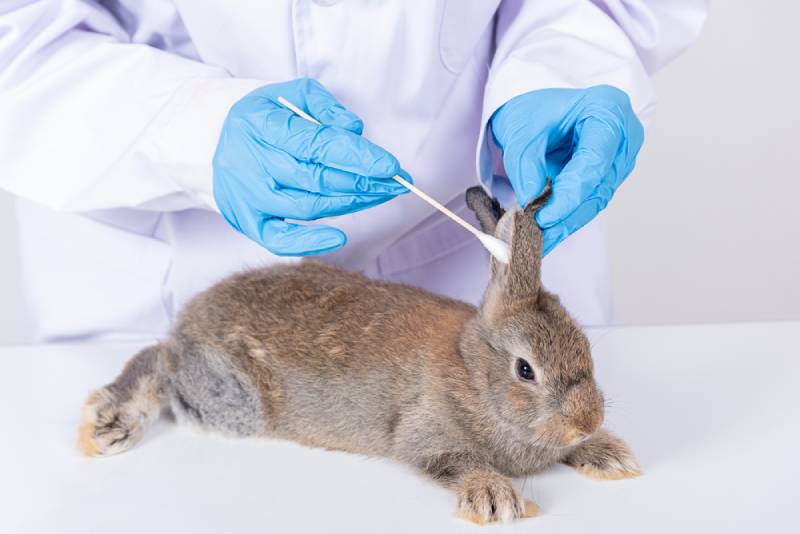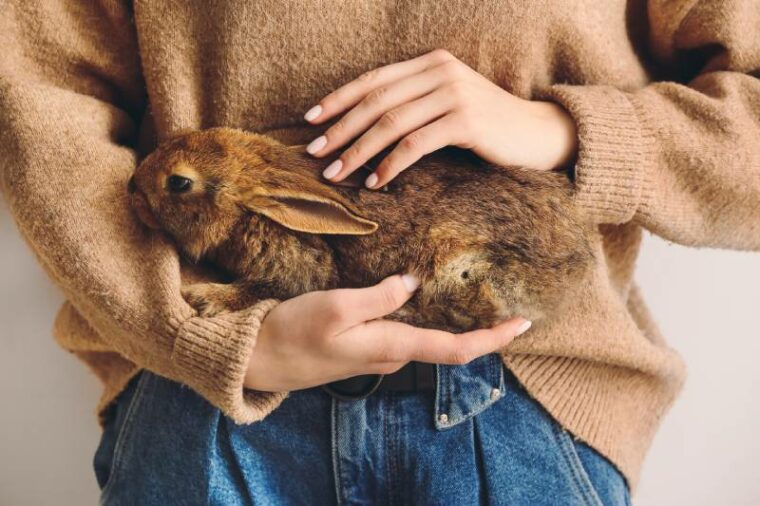
Fun, cuddly, and adorable, rabbits are, in many ways, the golden middle between dogs and cats. First, they are low-maintenance, space-effective, and not at all clingy. Rabbits are also quiet, easy to train, and quick to bond—that’s what makes them the perfect choice for millions of pet parents in the States!
Yes, there’s a lot to love about these cute little balls of fur. So, if you’re interested in adopting a bunny and want to learn why they make great pets, keep reading! First, we’ll go over the biggest pros of owning a rabbit. After that, we’ll share tried-and-true tips on how to keep a rabbit safe and well-fed.
The 12 Reasons Why Rabbits Make Good Pets
1. Rabbits Have Their Own Personalities
People sometimes think of rabbits as boring, but that is far from true. Each rabbit has its own personality. Some are playful, others come across as more mischievous. Your rabbit may be clingy or fiercely independent. Some rabbits absolutely can’t get enough of playing with toys, others turn their nose up to them. Be prepared to learn about your new rabbit and their preferences. You will likely be entertained by their antics!
2. Rabbits Are Great Companions
Once bonded with a human, a rabbit will show signs of enthusiasm when they see them. Your pet rabbit may enjoy doing things like watching TV with you or playing with empty paper towel rolls. As long as you understand the preferences and limits of your rabbit, the two of you can have a great time.
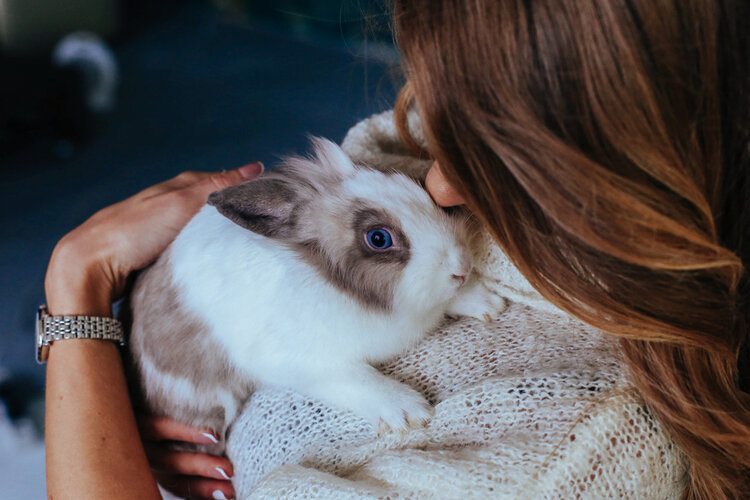
3. Rabbits Are Child-Friendly
There is no doubt that rabbits can make fantastic pets, but they are not well-suited for every family. Due to their preference for a calm and quiet environment, they are best kept away from small children. For an older child, however, a rabbit can be the ideal pet. Just be sure to train them on how to properly handle and care for their pet. Until you are confident they know how to handle the rabbit, supervise them closely while they are interacting. Having a pet rabbit can offer a good level of responsibility for a preteen or teenager.
4. They Get Along Well With Other Pets
Whether or not your cats or dogs can get along with a rabbit will depend largely on the temperament of all the animals involved. While sometimes these types of critters can become lifelong friends, a hyper dog or especially predatory cat may not make a good roommate for a rabbit. If you do decide to introduce a rabbit to your cat and/or dog, do so slowly and carefully in a controlled environment.

5. They Take Little Effort to Train
Some pets take months of excruciating training to turn into obedient, eager-to-please companions. Well, that’s not the case with rabbits! Most buns are happy to follow commands and don’t take nearly as much effort to train compared to the most stubborn cats and dogs. Litter training will take time, of course, but it’s going to be a very straightforward process.
Just like other pets, rabbits will start using the litter box for their bathroom breaks if you spend as little as 5–10 minutes per day training them. You might have to encourage the pet with positive reinforcement and some treats, but that’s about it. Bunnies are intelligent, capable creatures and learn new tricks like running through a maze, finding a toy, or jumping hoops in the blink of an eye.
6. Rabbits Are Quiet & Peaceful
Buns are curious and energetic, and they do love to investigate their surroundings and socialize. But, at the same time, they’re not at all loud. Rabbits don’t make any noises that can disturb a person’s sleep or cause trouble with the neighbors. Thus, if you’re in the market for a serene, tranquil pet that won’t wake you up in the middle of the night, a bun can do that for you.
Do keep in mind, though, that some rabbits are very active. That’s why it’s recommended to take one for a “test drive” before adopting the pet. It might even be that the bunny is very shy and likes to keep to itself and that’s not what you’re looking for in a pet. Ideally, look for a bun that matches your energy.
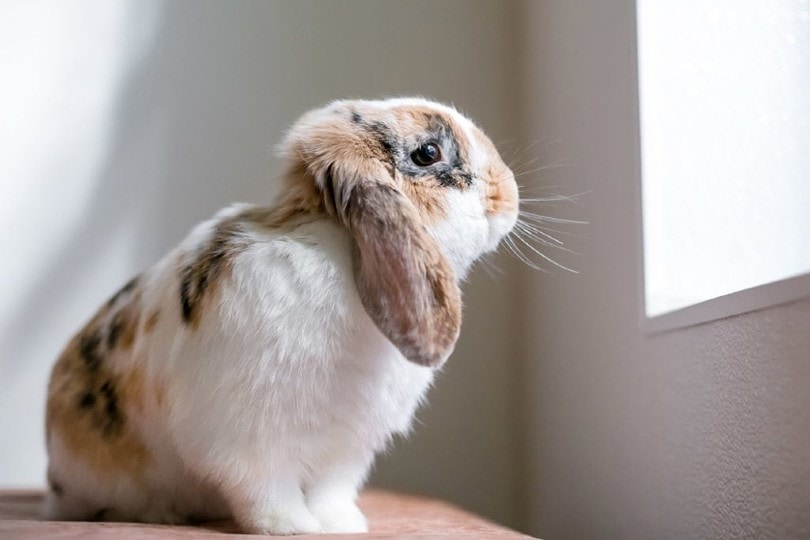
7. They Need Very Little Space
Bunnies are quick to adapt to various environments and don’t necessarily need a huge backyard to flourish. While every breed is different, most rabbits can be perfectly fine in confined areas with little to no access to the outdoors. If you live in a small apartment and have very little time to spend on a pet, bunnies will be the right pick. A small- or medium-sized crate with a feeding station and a pan: that’s all they need!
Rabbits won’t get anxious or depressed inside a cage as long as you let them out for an hour or two.
8. Buns Do Cute Binkies & Flops
Hands down, binkies are among the most adorable things to ever witness. When they’re happy and want to share their joy with you, rabbits jump up high and perform karate moves in the air. In other cases, they run around the house really fast, almost like they’re the fluffy version of the Flash. A little bit of head shaking might also be part of the performance.
A single binky is often enough to make you laugh and fix a bad mood. As for flops, it’s when the pet rolls to the left or right side and dozes off. In the wilderness, rabbits rarely (if ever) do that, as this position leaves them exposed. Therefore, a bunny that flops under your watch is a pet that feels 100% safe and relaxed, and you should take pride in that!

9. Rabbits Create Brick-Strong Bonds
Sometimes, it takes rabbits a bit more time to warm up to people, but once you create a trusting relationship, that bunny will only have eyes for you. And, while buns can’t exactly protect their human parents quite like a big, strong dog would, their affection is more than enough to compensate for that. Show it love, and the bun will start to treat you like family: follow you around, cuddle, and sit on your lap in front of the TV.
But what about other pets—do rabbits tend to bond with them as well? If you raise two buns together and socialize them at an early stage, the answer is yes. However, most rabbits don’t like to be around dogs and cats, as they’re the prey in that dynamic, not the hunter (or, at least, an equal). To make this work, you will have to do a lot of supervision along with obedience training and build a “safe haven” for the bun.
10. They Are Mostly Self-Sufficient
To clarify: as the pet parent, you will, of course, have to keep the litter clean, fresh, and dry, plus supply the rabbit with food and water. That said, we’re happy to add that bunnies are very good with hygiene. They like to stay clean and need little help from the owner’s side. Occasional brushing will be required (like 2–3 times a week), but, for the most part, rabbits are low-maintenance animals.
In this regard, they are very similar to cats. And you can use all that extra time that you’d otherwise spend on grooming the bun to do something fun with it.

11. Bunny Sleep/Wake Cycles Fit Human Schedules
Did you know that rabbits are crepuscular creatures? That’s right! They sleep several times during the day and only wake up when it’s dark outside. We’re talking about dusk and dawn. So, why is that a pro? Well, when you wake up in the morning to take a shower, have a bite, and leave for work, most likely, the bun will be up and ready to rumble.
More than that, when you come back, the fuzzy pet will be waiting for your cuddles! Now, every single rabbit is different, of course, and your schedules might not match perfectly. Still, there’s a very good chance that you’ll get to pet the bunny before you get started with the day and do some “Netflix and chill” with it before hitting the sack.
12. Rabbits Don’t Require Daily Walks
In contrast to dogs, rabbits don’t need to be walked every day to stretch their legs and socialize. Bunnies don’t want to do any high-energy activities like running, hiking, or climbing, either. So, if you have to wake up early and usually spend most of the day at work, you won’t have to hire someone (or ask a neighbor or relative) to take care of the pet while you’re away.
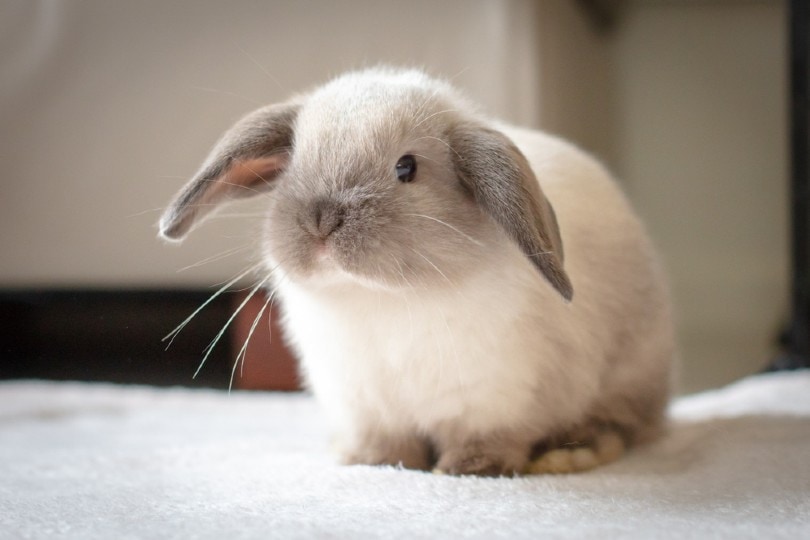
Learning About Rabbits
Before making the leap and bringing a rabbit home, it is important to learn everything you can about them. For instance, did you know they can live between 8-12 years domestically?
[quote-box]Getting a pet rabbit is a major time commitment for years to come. They should never be brought on a whim.[/quote-box]Many people see rabbits as the type of pet that you feed and forget. This is simply not the case, and it is why so many of these rabbits end up at shelters. A rabbit needs regular exercise and interaction as well as a special diet. Learn as much as you can before adopting your new pet. You should take the responsibility of a new rabbit as seriously as you would a new puppy.
Decisions to Make About Owning a Rabbit
Rabbits are great pets but they are not without their challenges. There are several questions to ask yourself when committing to care for a pet rabbit, such as:
Will they be indoor or outdoor?
Although your rabbit may enjoy getting outdoors sometimes (safely!) it is better to have them live indoors with you. You do not want to expose them to extreme temperatures or predators.
Will you attempt litter box training?
Although it works differently than with a cat, you can absolutely train your rabbit to do their business in a box. This can make cleaning their cage easier and give them a more sanitary living space.
What will you feed them?
The digestive system of a rabbit is delicate. You cannot just throw down some “Rabbit Chow” and expect them to be healthy. You will need to research what is and is not good for rabbits and feed them a varied diet.
Are you ready to groom a rabbit?
Be sure you have the time, equipment, and knowledge to take care of your rabbit’s grooming needs.
How Do You Keep a Bunny Safe? A Quick Guide
If you live on a property, make sure there aren’t any poisonous plants in the garden. We’re talking about daffodils, nightshades, and lilies, to name a few. Instead, plant some sunflowers, dandelions, and yarrows: these flowers are beneficial for buns. They also like to chew on cabbage; so, if you’d like to keep your precious crops safe, you might want to cover or fence them.
Generally, rabbits favor most weeds, but they shouldn’t munch on grass clippings, as they might upset their stomachs. More importantly, NEVER use any chemicals unless the bunny isn’t allowed on the lawn. Insecticides often cause severe harm to rabbits and other pets. And here are some more tips for bunny-proofing your yard:
The 101 on Feeding a Domestic Rabbit
Bunnies aren’t at all fastidious when it comes to food. As long as the pet has enough hay (around 70% of the diet) and some fresh veggies (leafy greens) to spice things up, it will be happy. Also, don’t forget to provide it with a pack of pellets (only 10% to avoid obesity) and a fresh bowl of water. And what about the foods that are not recommended for rabbits? The list includes cookies, sweets, bread, and nuts.
Grains and seeds should be excluded from a bun’s diet as well. As for fruits, you can occasionally treat the pet with an apple or berry (like once in 2–3 days) but be very careful not to overfeed it. Fruits are rich in sugar (glucose, to be exact), which can upset the rabbit’s digestive system. The same goes for carrots: they are allowed, but only in limited quantities.
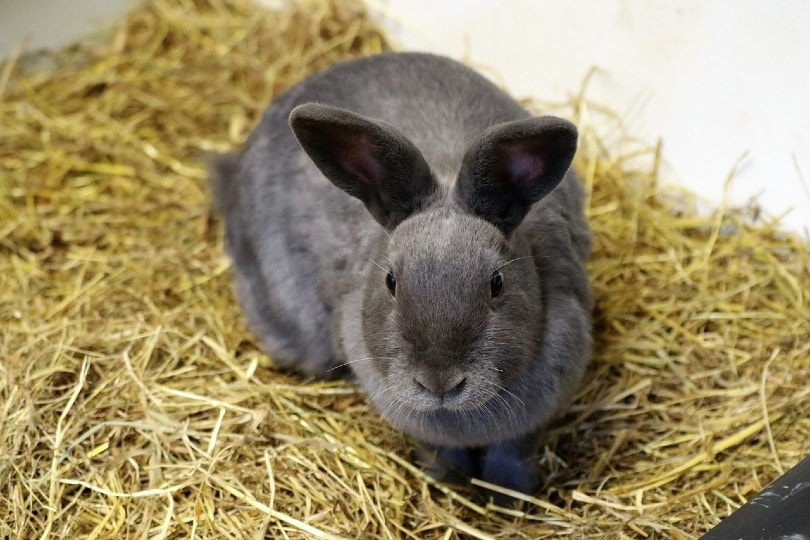
Conclusion
Rabbits are amazing creatures. Those big, round eyes, pointy ears, and twitchy noses are enough to cause cuteness overload and melt the coldest of hearts. But that’s not even what makes them a great choice as pets. Bunnies are easy to train, obedient, affectionate, and don’t need acres of land to be happy.
For this reason, folks in the market for an alternative to cats or dogs that can do a binky and chew on hay should consider adopting a rabbit. You will, of course, have to take proper care of the pet, like keeping it safe, feeding the bun premium-quality food, and stimulating its mental health. But in return, you’ll get a puffball full of joy!
See Also:
Featured Image Credit: Pixel-Shot, Shutterstock



